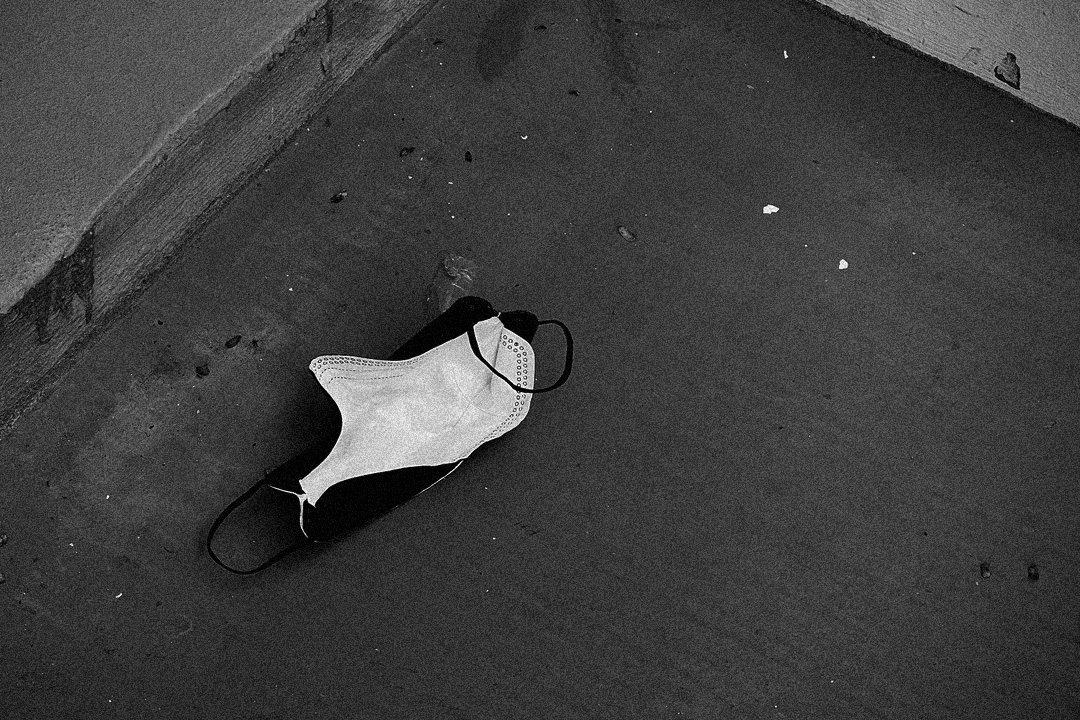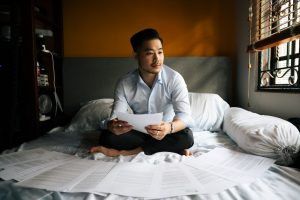Top image: Zat Astha
All other images: Isaiah Chua/RICE Media
A recent TikTok video from Circle.Life opens with a male staff member, black mask drawn to his chin, animatedly explaining a marketing pitch over a video call with his earphones plugged in.
Below, the caption reads, “that one colleague that’s waaay too loud in his zoom meeting 
This video is by no means receiving overwhelming support with a mere 1,006 likes, 25 comments, and 51 shares. Still, it’s a cute take on life in a pandemic with comedic realities that intersect—workers having to go back to the office and video meetings evolving to become a norm. All in all, a simple and effective video that demands so little of the self while managing to be hilarious.
This earnest depiction of office life didn’t stop tiktoker69 from commenting, “wear ur mask la kunji“—kunji is a Tamil slur that means penis. I replied tiktoker69, “Stop mask policing lah. They know what they’re doing. Geez.” followed by a response by Circles.Life that went on to explain, “We promise it was for the TikTok only. All safety guidelines are followed as always.”
The entire interaction ended with tiktoker69 calling me a ‘covidiot’. A term I thought has been banished into the annals of time, popular back when there were rampant cases of people not wearing their masks in the wake of a circuit breaker.
Evidently, it lingers, albeit simmering quietly in the background, though, with the latest announcement on easing of restrictions by PM Lee last Thursday, is a word that threatens to make a victorious comeback.
Indoor vs outdoor
On 24th March 2022, PM Lee held a live broadcast where he announced, amongst other easing of measures, that, come 29th March, masks are optional when outdoors. Following the announcement, the Multi-Ministry Task Force outlined which spaces are demarcated as outdoors and which will be classified as indoor.
HDB void decks, HDB retail shop walkways, bus stops, naturally ventilated bus interchanges, and open-air sheltered walkways and bridges are defined as outdoor spaces. Indoor spaces include office buildings, malls, lifts, public transport, hawker centres, wet markets, classrooms, and libraries.
Do I worry that Singaporeans can’t discern outdoor and indoor spaces on their own? Yes. Am I surprised that the government thought it fit to define it for us, however insufficient? Absolutely not.
Still, the government’s guidelines on indoor and outdoor spaces are not exhaustive—and not for lack of trying. It’s impossible to properly and comprehensively define every living space available on this island off of a binary. To expect explicit categorisation is ridiculous.
That is why, barring specific categorisations, we might have to practice common sense, prudence, and social responsibility—words almost unheard of in rule-worship Singapore where citizens prefer to be told what to do, where to do those things, and how, before grumbling and whining about its merits and demerits online and complaining about how the government is so unnecessarily controlling.
Following the science
And when we can finally move past semantic definitions, can Singaporeans be counted on to properly and adequately self-regulate mask mandates without being viciously policed by over-zealous passersby or recorded on our handphone cameras in glorious 4K resolution? Can Singaporeans be tasked to think the best of people when situations get murky and undefined?
I want to say yes, but evidence online seems to say otherwise. Comments on a dance video I came across earlier this week on TikTok, where a group of ten youth dancers, all masked and pulling off some sick moves, had people asking if the ‘gathering’ was legal.
“Is a group of more than five allowed?” someone asks in the comments, completely missing the point of these ten bodies moving in perfect synchronicity. “Yes,” someone else replies. “Anywhere got mask on, no need safe distancing.” I wouldn’t be so polite.
I posit it’s all due to our love for rules and our propensity to ensure everyone keeps in line. Singaporeans don’t mask-police because they understand the science of virus transmission—they do it because the law says so. They take pictures of people not practising safe distancing not because they are cognizant of the science of respiratory droplets in the air but because the government mandates it. These public vigilantes obey without question. They’re great for war—not so great for resuming normalcy.
Still, the decision to make wearing masks outdoors optional is an explicit embrace of the science by the government. “From a virus standpoint, there’s no indication that omicron is behaving differently [in outdoor settings],” says Dr Preeti Malani in an interview with NPR. She’s an infectious disease professor at the University of Michigan.
“That doesn’t mean [transmission is] impossible if you’re packed together in a place that’s only sort of open-air and if people are sharing food or kissing or drinking,” Dr Malani went on to explain.
“But if it’s a casual interaction outside, even if it’s relatively crowded, I’m comfortable not having a mask on. And at this stage of the pandemic, we have to find ways to do things that are meaningful to us.”
The spectrum of mask-wearing
On the heels of the announcement, and after a quick read of comments on social media, I observed Singaporeans struggling most with the term ‘optional’.
It bears repeating, however niggling, that wearing masks outdoors is not banned—it’s merely optional. There’s a difference. Come 29th March, we have the agency, depending on our risk tolerance, to decide if we want to mask up outside. No one is about to detain and slap a fine on you if you choose to continue wearing masks outdoors.
This is important to remember because social responsibility means that if you’re sick, coughing and sneezing, you should mask up regardless if you suspect you’re stricken with Covid-19.
Similarly, if the pandemic has made you more conscious about hygiene and virus transmissions, feel free to keep your mask on. No one will shame you for your decisions. This is, after all, not America.
And as more vaccinated foreigners descend on our shores, ready to soak in some tropical Vitamin D, we’ll also see non-Singaporeans making the same choices as we have and not mask-up outdoors. Can we be counted on to keep our anti-foreigner tendencies (you know who you are) in check and our handphones firmly in our pockets when we see tourists having a little too much convivial, but perfectly legal, fun in the sun? Can we be less angsty about non-Singaporeans having the same agencies on weekends as we do?
Additionally, with this new masking regulation, we may have to contend with mask-wearing as a spectrum versus a strict binary of legality.
It means that I may insist on everyone wearing a mask if I’m outdoors with a group of friends and someone in the group is living with an elderly and unvaccinated family member. But I feel perfectly comfortable not wearing a mask while flying kites at a crowded park with my fully vaccinated family.
It is, in essence, a spectrum of personal comfort mixed with the variable condition of circumstances that a legal binary could never fully address.
Naturally divided opinions
Yet, even with all these much-welcomed announcements of easing restrictions, some are convinced we’re opening up and relaxing measures too quickly. These people would applaud covid-zero China, where a lack of institutional common sense paired with a burdened over-caution leads to a failing and flailing pandemic strategy. “Hope we don’t make a mistake as I believe that wearing a mask is a way of protection which is a “MUST” moreover everyone should be responsive to wear in order to protect each other,” one commentator declared.
Others think it’s too convoluted. “Why have to do thing complicated. What sort of nonsense,” writes a user on Straits Times Facebook page. Another said, “Better be safe than sorry. Can’t believe government implement this outdoor can dun wear mask 

And then there are media outlets that, in a bid to perhaps mock the uncertain indoor-outdoor definitions of the new mask-off mandate, took pains to describe what a typical mask-on-mask-off day would look like come 29th March. While such depictions are effective at getting readers riled up, clearly, such media outlets have missed the forest for the trees.
With PM Lee’s announcement, it’s evident that the government has taken a clear side on the road to endemicity by moving forward decisively—convoluted as the rules may seem for some—while still pausing at every turn long enough to observe impact. After all, what else can a country dependent on tourism, international trade, and global talent do than to open quickly and without haste?
Still, I’m confident that these new and drastic easements of restrictions portend bigger things to come.
Making wearing masks outdoors optional is a step towards lifting the mask mandate. Allowing the sales and consumption of alcohol past 10.30pm is the first step towards a full resumption of Singapore’s once-vibrant nightlife scene. Increasing capacity limits to 75% is in preparation for our MICE industry to resume.
And what of our love-to-hate Safety Distancing Ambassadors (SDA) in red? In response to a question from Yahoo News Singapore, Health Minister Ong Ye Kung encourages everyone to take on more social and personal responsibility and rely less on external forces or enforcement checks.
“If more people can do this and uphold that sort of personal responsibility, then we will scale back our SDAs and allow these people to be redeployed in other sectors for which there are huge demands for manpower,” Mr Ong adds.
If the government is unsure of where to funnel these SDA officers, perhaps they can take up the suggestion of Nicholas Yong. In an opinion piece on Yahoo!, the Assistant News Editor suggests the MTF think about “redeploying the army of safe distancing ambassadors to healthcare and quarantine facilities, instead of sending them to restaurants with a measuring tape to ensure customers are sitting one metre apart.”
Whatever the case, the time of the SDAs is over, and it’s now incumbent on Singaporeans to self-regulate and practise good judgement and social responsibility—hard and almost impossible as it may seem.
As for me, come Tuesday, 29th March at 12:01am, you can find me wandering the quiet streets of Serangoon North and Serangoon Gardens, sans mask, breathing in the fresh night air with nary a feeling of guilt. And then in the afternoon, I will stand at the bus stop, my face towards the sun, humidity still on my skin, the sun slightly blinding my vision such that I have to squint. People might stare and tsk visciously, but I reckon that’s a small price to pay for a hint of life back to the normalcy we once knew.







